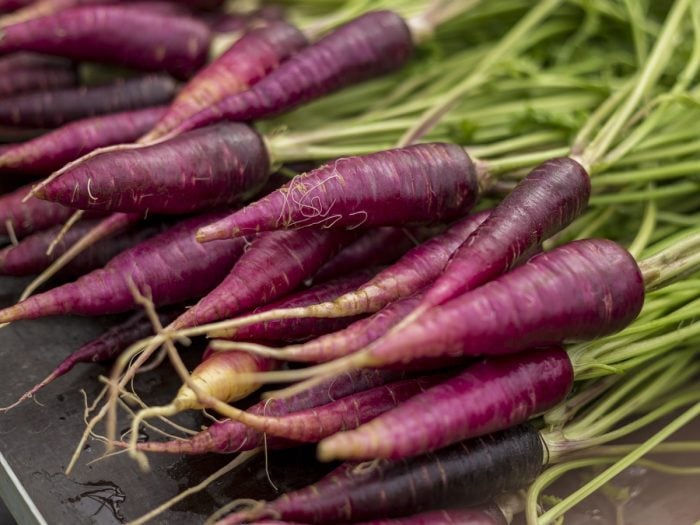While many people have never heard of – or eaten – a purple carrot, they are deliciously sweet additions to many different meals. The taste of the purple carrots is not the only reason to eat them because they are also packed with a good amount of nutrients and health benefits!
What is a Purple Carrot?
A purple carrot is a color variant of traditional carrots, which bear the scientific name Daucus carota subsp. sativus. While most people in the US and UK are familiar only with orange carrots, purple carrots are far more commonly found in the East, particularly in China and India. However, they were first cultivated more than 1,000 years ago in the region of Afghanistan, and they spread from there. What many people don’t realize is that purple carrots were actually the original form of these globally popular vegetables. Paler colors only originated later, once the carrots were grown in different regions. These uniquely colored carrots are high in anthocyanin, which gives them their characteristic color and a surprisingly sweet taste. [1]

Purple carrots are especially rich in powerful antioxidants. Photo Credit: Shutterstock
The larger the carrots, the larger the central core, where most of the nutrients are stored, which results in more sweetness. Although the exterior of these carrots may be purple, the center is often yellow or orange. Purple carrots can be used in the same ways as any other carrots – in soups, stews, salads, sandwiches, stir-frys, and as a raw snack. While they aren’t as readily available in the US and UK as they are in Asia, they can easily be found in specialty grocery stores and import stores.
Purple Carrot Nutrition
Purple carrots have a similar nutrient profile to other types of carrots, with a few important distinctions. These carrots are a rich source of dietary fiber, vitamin C, potassium, manganese, and vitamin K. There is a low level of calories – only 25 calories per cup – and only 5 grams of carbohydrates. When it comes to antioxidants, however, purple carrots have a good lutein and beta-carotene content. Purple carrots also contain more phenolic compounds, such as anthocyanins, than any other carrot variety, except for black carrots. [2]
Purple Carrot Health Benefits
The most impressive health benefits of purple carrots include its effects on weight loss, chronic disease, inflammatory conditions, vision, and circulation, among others.
Weight Loss
Purple carrots are particularly prized for their place in a weight-loss diet. This low-calorie, low-fat, and high-fiber vegetable is an excellent way to fill yourself up without compromising your dietary goals. Furthermore, digesting all of that fiber can help to speed up your metabolism, which can help with passive fat-burning if you’re trying to shed pounds.
Reduces Inflammation
Research has shown that anthocyanins, which are found in high concentrations in purple carrots, can help relieve many different inflammatory conditions, including arthritis, gout, headaches, and even hemorrhoids. [3]
Improves Vision
Although purple carrots contain less beta-carotene than orange and yellow varieties, there is also a significant amount of lutein and zeaxanthin in these carrots, all of which can help to improve vision. These antioxidants will reduce oxidative stress in the retina, preventing macular degeneration and lowering your risk of cataracts. [4]
Improves Circulation
There is a decent amount of iron in purple carrots, which is great for boosting circulation, but the presence of vitamin C and other antioxidants will also help to prevent breakage and blockage within the circulatory system, ensuring that all your metabolic processes continue normally. [5]
Treats Chronic Disease
The high level of anthocyanins found in these colored carrots means that they are excellent antioxidants; these compounds are able to seek out and neutralize free radicals, which are responsible for cellular mutation and other forms of chronic disease, such as heart diseases, and rheumatoid arthritis. [6]
How to add Purple Carrots to your diet?
Adding purple carrots to your diet is very easy and healthy as well. Here are some simple ways to add them to your diet.
- Purple carrot salads: You can dice some purple carrots and add to any salad of your choice
- Roasted purple carrots: Slice the carrots and roast them with some olive oil, salt, and pepper
- Stir-fries: You can add purple carrots to while making any stir fry along with your favorite vegetables or meats
- Carrots and hummus: You can serve sliced purple carrots alongside hummus
- Soups and stews: Purple carrots can be added while preparing any soup or stew
There are many ways to enjoy purple carrots, so start cooking and enjoy!
